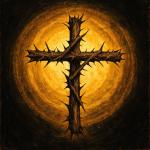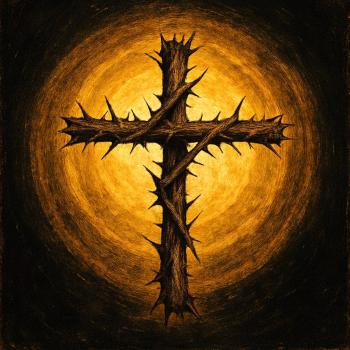Beyond Divine Violence
What do you do with Good Friday and the Cross when you’ve abandoned the doctrines of substitutionary atonement and the divine necessity of Jesus’ death? When you affirm that Jesus died because of sinful humankind, not to satisfy the wrath of God toward humanity?
Like many progressive Christians, I grew up hearing the mantras “Jesus died for our sins,” “Jesus died so that we might have eternal life and escape God’s wrath,” “Jesus paid the price for our salvation,” and “our sin deserves death and Jesus stood in our place.” Recently, I saw a billboard with the stable and manger and three crosses in the background, with the description “born to die.”
Although I no longer believe in substitutionary atonement, I must confess that I still sing the songs of my childhood faith with their emphasis on transactional and vicarious atonement, “The Old Rugged Cross” and “How Great Thou Art.” I no longer believe the words of Stuart Hine’s the popular translation of “How Great Thou Art” –
And when I think, that God, His Son not sparing;
Sent Him to die, I scarce can take it in;
That on the Cross, my burden gladly bearing,
He bled and died to take away my sin
Then sings my soul, my savior God to thee,
How great thou art
How great thou art. –
Still, the hymn is still dear to my heart and represents the simple faith of my small-town Baptist childhood.
Rethinking “orthodoxy”
Without reflecting on the meaning of their favorite hymns or the impact of Jesus’ death in the drama of salvation, many 21st century Christians, who regularly use AI, ponder photos from the Hubble telescope, marvel at images of black holes, go to Sikh and Hindu doctors, and believe that humankind emerged from a multi-billion year process of evolution, assume the following statements reflect the essence of Christianity:
- Human sin brought death into the world.
• We are born steeped in this original sin.
• Finite human sin, ours and Adam’s and Eve’s, deserves eternal divine punishment.
• Jesus came to break our bondage to sin.
• Jesus’ death was foreordained and Jesus lived his adult life knowing he was going to die on the Cross.
• Jesus’ death is God’s way of securing our salvation by appeasing God’s wrath.
• Only a divine sacrifice can free us from sin and insure eternal life, rather than eternal damnation.
• The only pathway to salvation is a personal relationship with Jesus, demonstrated by an explicit affirmation of our sin and the sole salvation of Jesus Christ.
Many believe that these are the only possible Christian understandings of the cross, forgiveness of sin, and salvation, and have left Christianity because these beliefs no longer reflect their personal experience or offend their ethical and spiritual sensibilities. They yearn for alternative ways of viewing the cross and the nature of divine sacrifice. They are looking for good news beyond God’s sacrifice of his son for salvation.
There is good news beyond the violent substitutionary atonement and divine violence, and it is God’s universal and amazing grace and love, given without measure from the dawn of time.
Although these “orthodoxies” of the past – claimed to be the only to understand the cross by some – may have provided assurance for us once upon a time, to many of us who still call ourselves Christian, they no longer make sense, nor do we believe in a God who requires the death of “his” son to secure our salvation. We also see divine grace operating in other religious traditions and in the experience of faithful agnostics. We also see the cross as a “invitation” to discipleship and justice seeking and not an “escape” from divine punishment. Still, many of us attend Good Friday services; some of us, like me, even preach at such services, despite our theological and liturgical reservations.
Affirming an Empathetic God
Our quest to be faithful as we remember Good Friday begs the question: Can we as progressives “redeem” Good Friday in a way that affirms the interplay of divine love, human creativity, and human brokenness, while avoiding dubious theologies that assume salvation requires violence, including the predestined death of God’s only Child?
We recognize that we need a loving power greater than ourselves to save us, and we also know that our salvation and the future of the earth depend on our willingness to be actors, rather than passive observers in the healing of the earth. We need theologies that recognize that Jesus’ saving action inspires our own willingness to become partners with God in saving the earth.
I believe that we can creatively remember Good Friday in worship and ritual by reflecting on the interplay of our personal and institutional shortcomings and God’s passionate companionship. “Were You There When They Crucified by Lord?” is the quintessential Good Friday hymn. Of course, none of us were there physically. But we are all part of an ambiguous history that persecutes prophets and promotes celebrities and oligarchs. On Good Friday, we can ponder all the small and large crucifixions going on right now in our world, often unnoticed, but very real – death dealing actions that lead to melting polar icecaps, global climate change and the potential cataclysm that awaits our children and children’s children, complacency at mass starvation and genocide, hatred of immigrants, our addiction to oil and gun ownership, adulation of a bullying and prevaricating national leader, and the list goes on, even before we explore our own personal ambiguities and culpability in the subtle violence of everyday life.
Even though Jesus’ death was neither foreordained nor necessary to appease God’s wrath, we can recognize that we are no better morally and spiritually than many of those who shouted for Jesus’ crucifixion, stood idly by doing nothing to prevent it, and implicitly sentenced Jesus by their involvement in political and religious institutions. Are our political leaders – and we as USA citizens – any more moral than Pilate or the Jewish religious leaders? We also operate out of self-interest and are willing for many to suffer or die for the “American way of life.”
Good Friday also affirms the tragic beauty of God’s relationship with the world. Dietrich Bonhoeffer, from the vantage point of a prison cell, proclaims that only a suffering God can save and Alfred North Whitehead speaks of God as the fellow sufferer who understands. Throughout the centuries, Christians have debated the doctrine of patripassianism, the belief that God the Father suffers on the Cross with the Son, Jesus. While patripassianism, or divine suffering, has been labeled a heresy those who presume themselves to be the upholders of orthodoxy, based on the belief that the divine nature is incapable of suffering and that Jesus’ suffering touched his humanity but left his divinity unsullied, I believe that the deeper “heresy” (and heresy is a term I seldom invoke) is the belief that God does not suffer with the world. A changeless, unfeeling, and apathetic God can neither heal nor save. In contrast to a passionless deity, a meaningful vision of Good Friday proclaims that God suffered – the whole of God suffered – on the cross and in every moment creaturely suffering. God is not apathetic to our pain, God is empathetic, feeling our pain. God is the Great Empath, the heart of the universe, embracing the joys and sorrows of life with loving care.
Difficult as it is to admit our complacency and culpability, we can on Good Friday answer “yes” to the question, “Were You There When They Crucified My Lord?” We can also say “yes” to the grace that feels our pain and regret, the pain of those broken by the world’s greed and complacency and live in the hope that the One who feels also forgives and transforms and enables us to rise up with new energies for global healing. Then the cross becomes the pathway to responsible partnership with God in seeking healing and justice for our good earth and its human and non-human creation.
The cross calls us to sacrificial living and to world loyalty, and to the commitment to do something beautiful for God in loving the world that inspired Jesus’ own sacrificial living and dying.
++++
Bruce Epperly is Theologian in Residence at Westmoreland Congregational United Church of Christ, Bethesda, MD (https://www.westmorelanducc.org/) and a professor in theology and spirituality at Wesley Theological Seminary. He is the author of over 80 books including: “Homegrown Mystics: Restoring the Soul of Our Nation through the Healing Wisdom of America’s Mystics” (Amazon.com: Homegrown Mystics: Restoring Our Nation with the Healing Wisdom of America’s Visionaries: 9781625249142: Epperly, Bruce: Books) “Jesus: Mystic, Healer, and Prophet “(Jesus: Mystic, Healer, and Prophet: Epperly, Bruce: 9781625248732: Amazon.com: Books), Saving Progressive Christianity to Save the Planet”( Saving Progressive Christianity to Save the Planet: Epperly, Bruce G: 9781631999215: Amazon.com: Books), and his most recent book, “God of the Growing Edge: Whitehead and Thurman on Theology, Spirituality and Social Change.” (The God of the Growing Edge: Whitehead and Thurman on Theology, Spirituality, and Social Change: Epperly, Bruce G: 9781631999291: Amazon.com: Books The God of the Growing Edge: Whitehead and Thurman on Theology, Spirituality, and Social Change: Epperly, Bruce G: 9781631999291: Amazon.com: Books)















